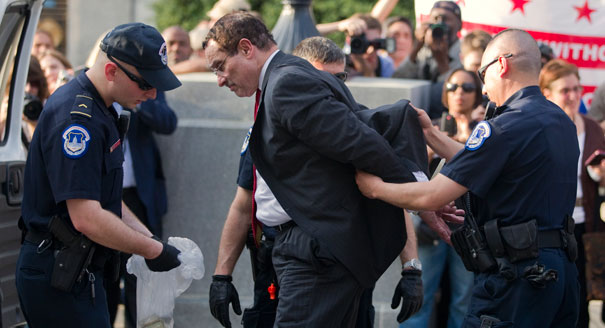Coin Operated DC Mayor Confused about whether Wal-Mart should pay workers $12.50 an hour
According to Walmart: "Walmart is the largest employer of Blacks & Latinos in the US. [MORE] In photo, another photo op for D.C.'s allegedly corrupt and invisible mayor.[MORE]
From Tribune Business News on 9/1/13 More often than not, local officials are accused of bending over backward to accommodate a retailer that's considering locating to their community. That's why what the Washington, D.C., City Council did earlier this summer came as a surprise to many: The council passed a law it knew might thwart development plans from a major retailer.
It wasn't just any retailer. It was Walmart. And it wasn't just any law. It was a "living wage" requirement that would force the store to pay employees $12.50 an hour?$4.25 more than the city's minimum wage.
The legislation had been on the back burner for several years as Walmart pursued plans for six stores inside the city limits. But when discussion of the legislation heated up this summer, Walmart issued an ultimatum: If the law takes effect, the retailer said it would scrap plans for three stores and reconsider three others already under construction. The council passed the measure anyway. Council member David Grosso says city leaders felt they didn't have to accept low-paying jobs. "Let's be a little bit picky," he says. As of mid-August, Mayor Vincent Gray had not decided whether to veto the bill.
When asked if the mayor plans to sign the act, Gray spokesman Matt Desjardins would only say "the mayor is still weighing all options and listening to members of the [wealthy, white] community," [MORE]
Across the country, more than 140 municipalities have living wage laws that require some employers to pay workers at rates above the minimum wage. But most of those laws apply to businesses receiving government contracts or some other kind of special treatment from a locality, says Harry Holzer, a professor at Georgetown University. In fact, Holzer says, he doesn't know of any city that's singled out a specific employer the way D.C. has. "This is a different kind of living wage." (In 2006, Chicago lawmakers passed similar legislation, but then-Mayor Richard Daley vetoed it.)
Many anti-Walmart advocates are portraying the D.C. Council's action as a major victory and are hoping other cities will follow the district's lead as Walmart and other retailers?having saturated the suburbs?pursue a strategy of urban growth. But council member Muriel Bowser, who voted against the legislation, says it threatens development, especially in poorer parts of the city. "I think there is this confused notion that, because we're a growing city and we have economic development happening, that all parts of Washington are really sought after areas to develop," she says. "We just know that's not the case."
Distributed by McClatchy-Tribune Business News
